人教版八年级上册Unit 9 Can you come to my party-Section A-1a-1c 课件(共43张PPT)
文档属性
| 名称 | 人教版八年级上册Unit 9 Can you come to my party-Section A-1a-1c 课件(共43张PPT) | 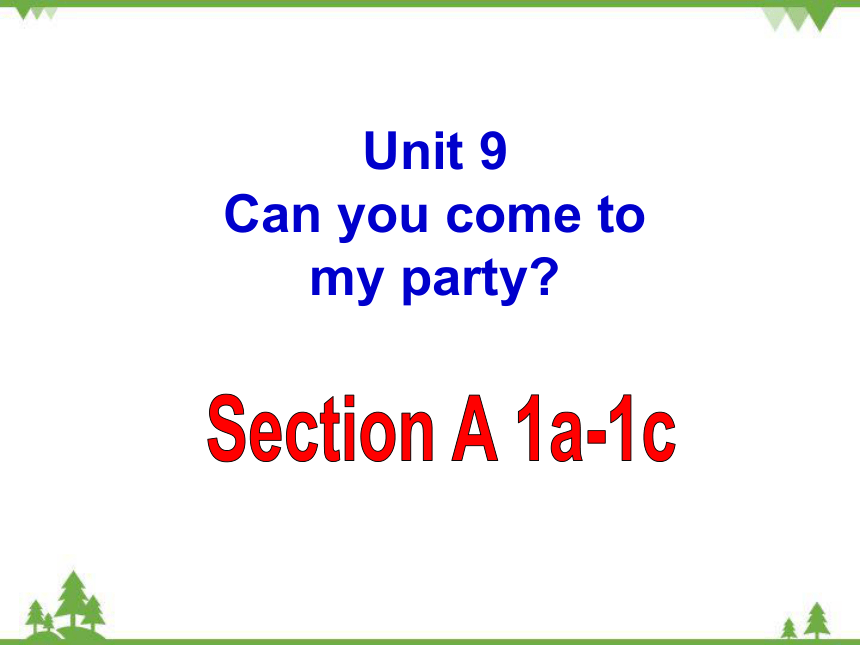 | |
| 格式 | ppt | ||
| 文件大小 | 4.3MB | ||
| 资源类型 | 教案 | ||
| 版本资源 | 人教新目标(Go for it)版 | ||
| 科目 | 英语 | ||
| 更新时间 | 2023-02-15 21:02:43 | ||
图片预览

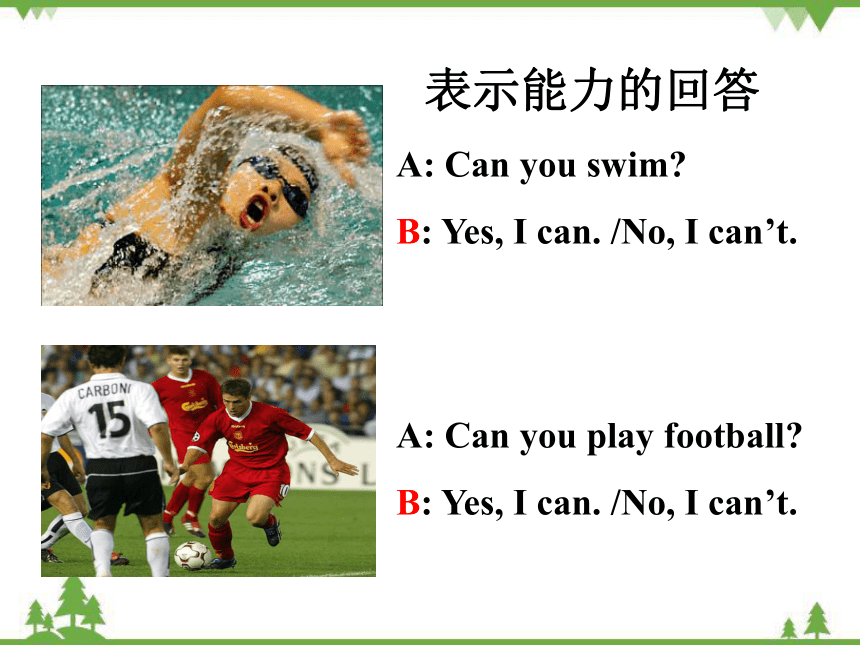
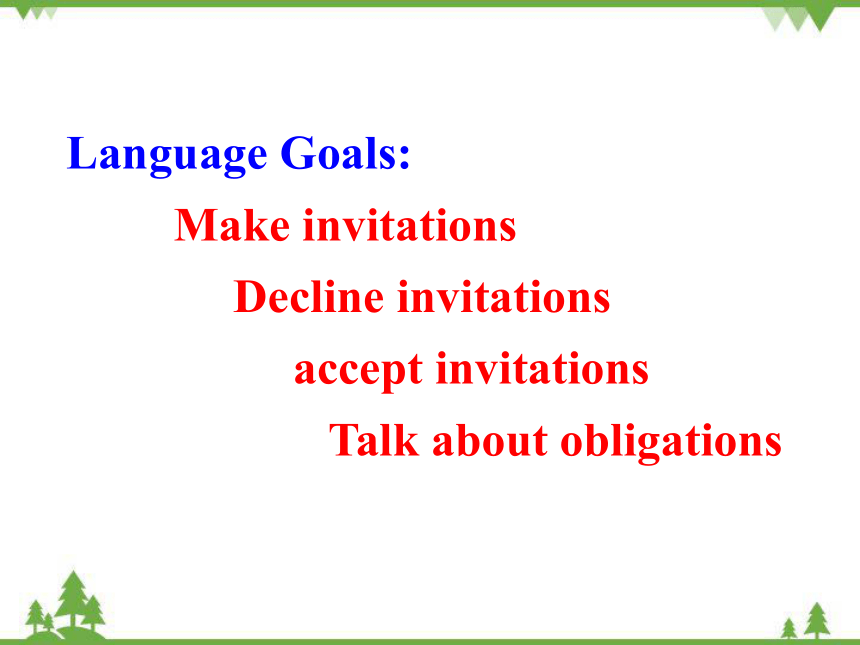

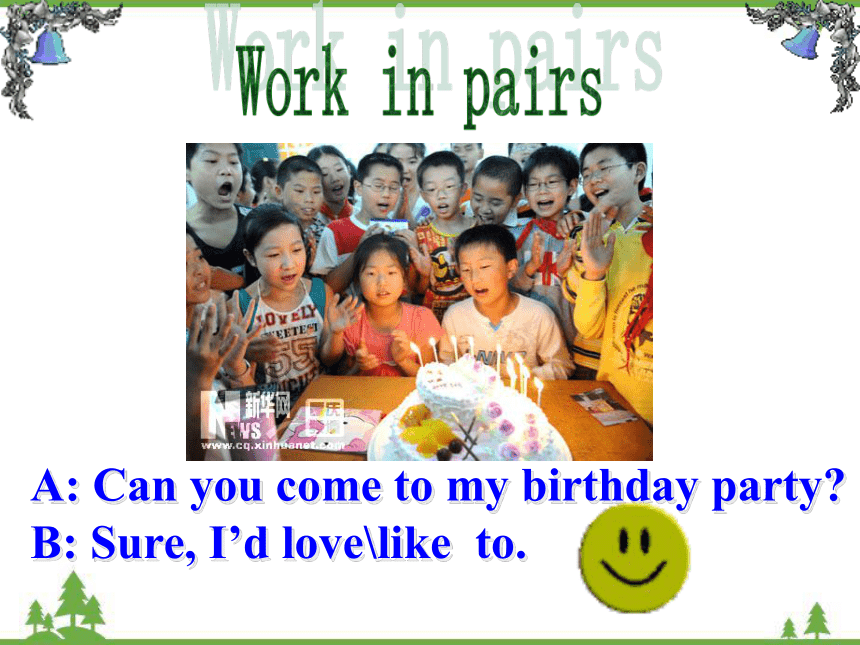
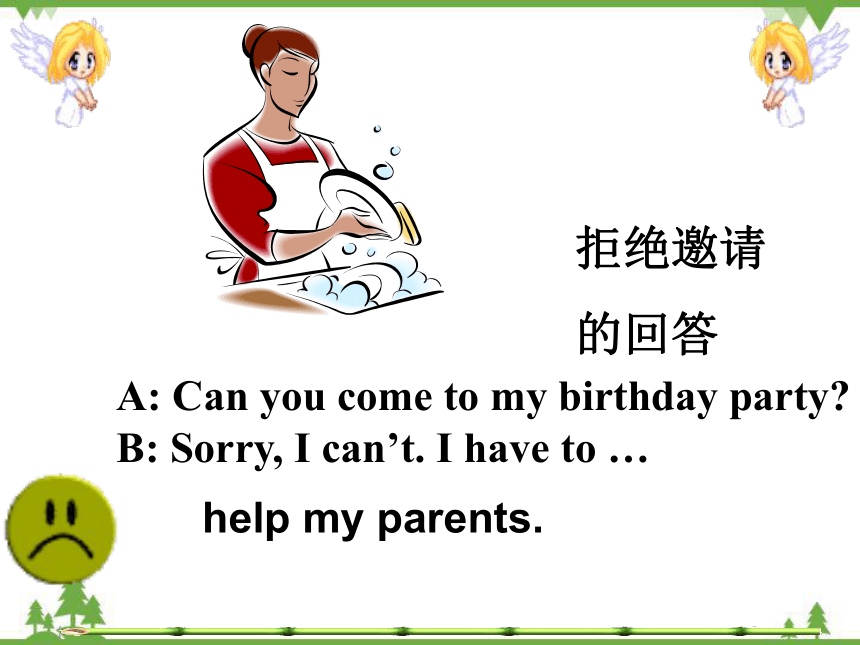
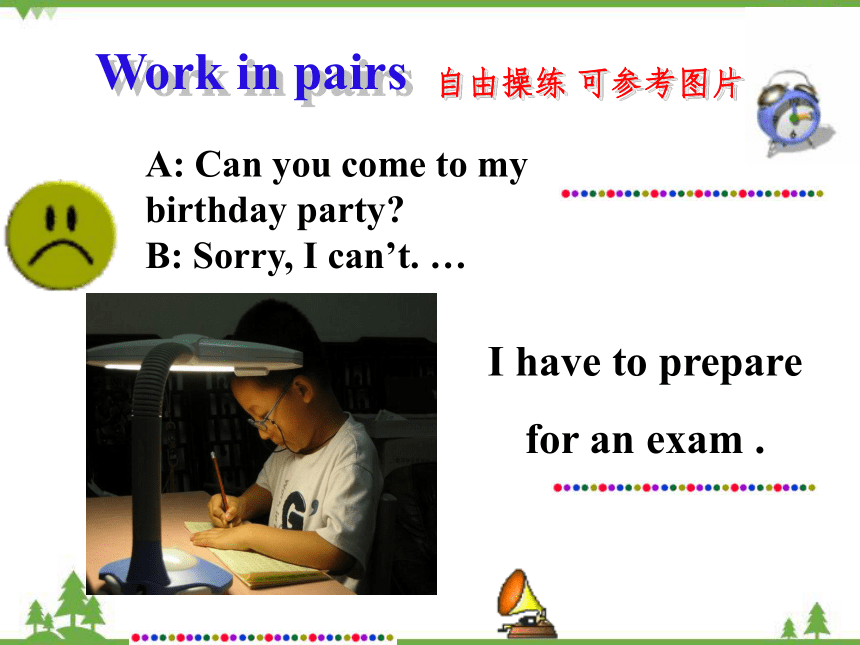
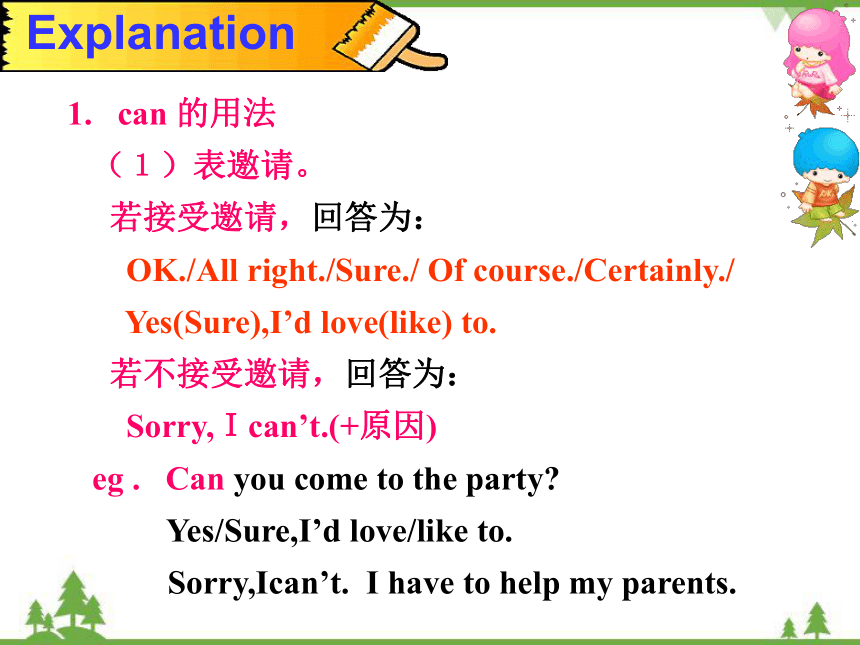
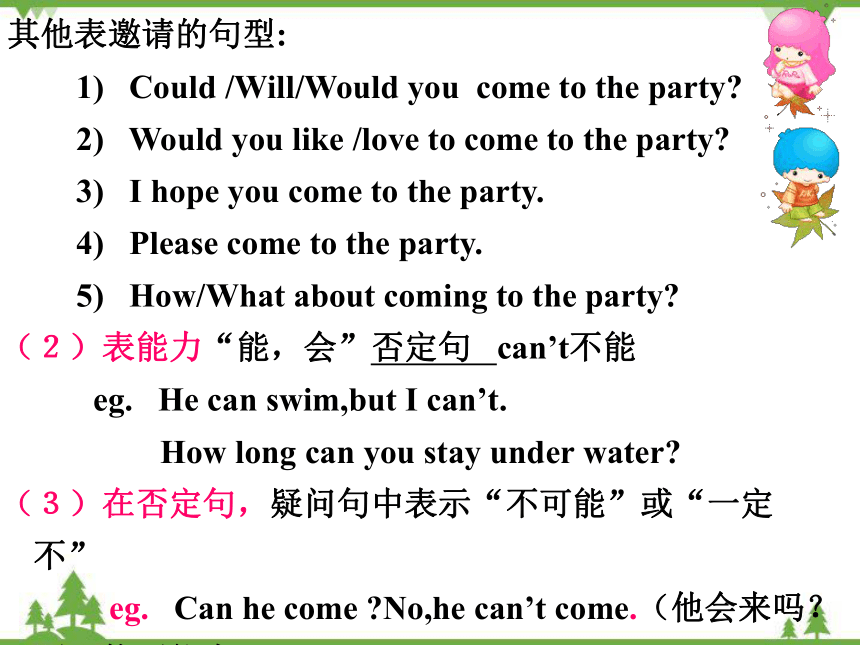
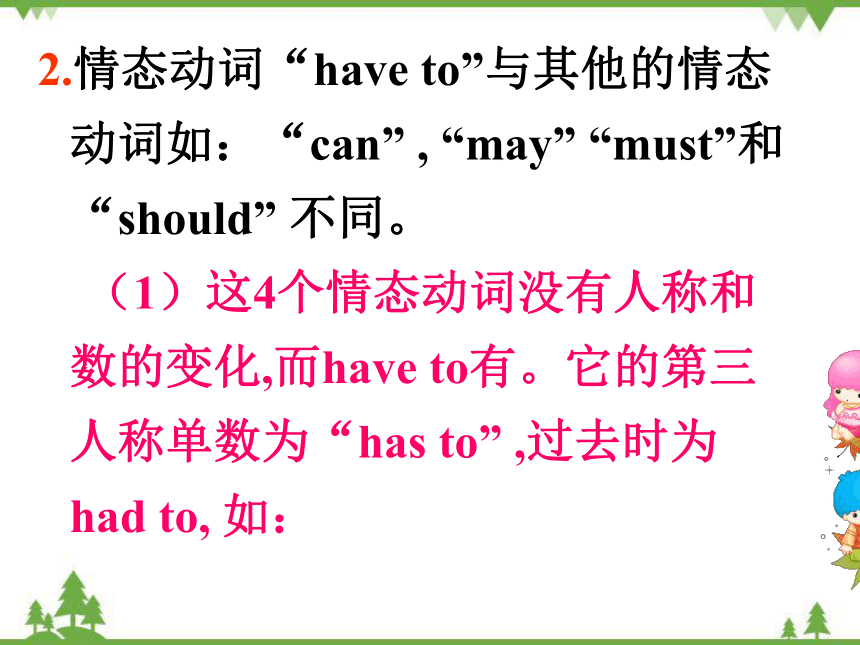
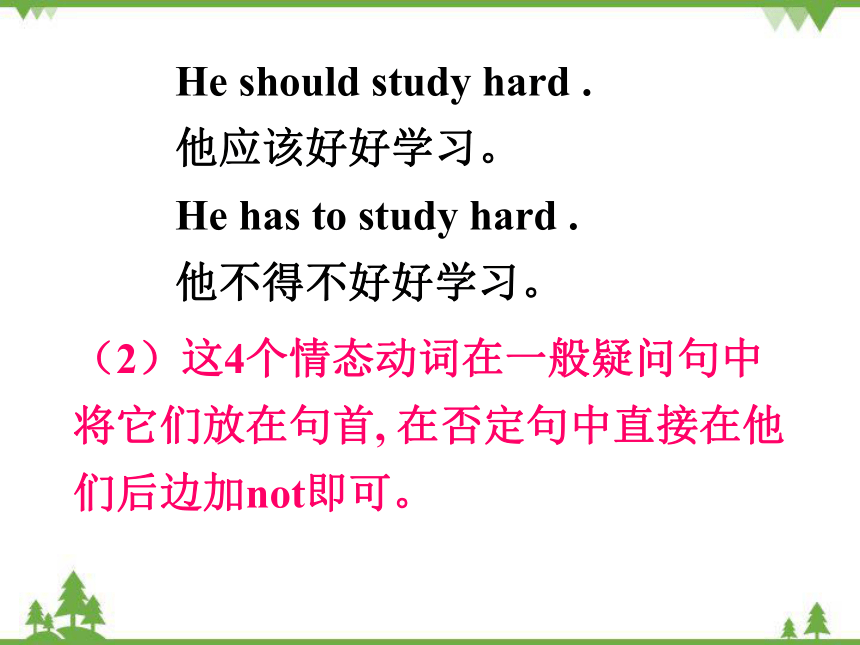
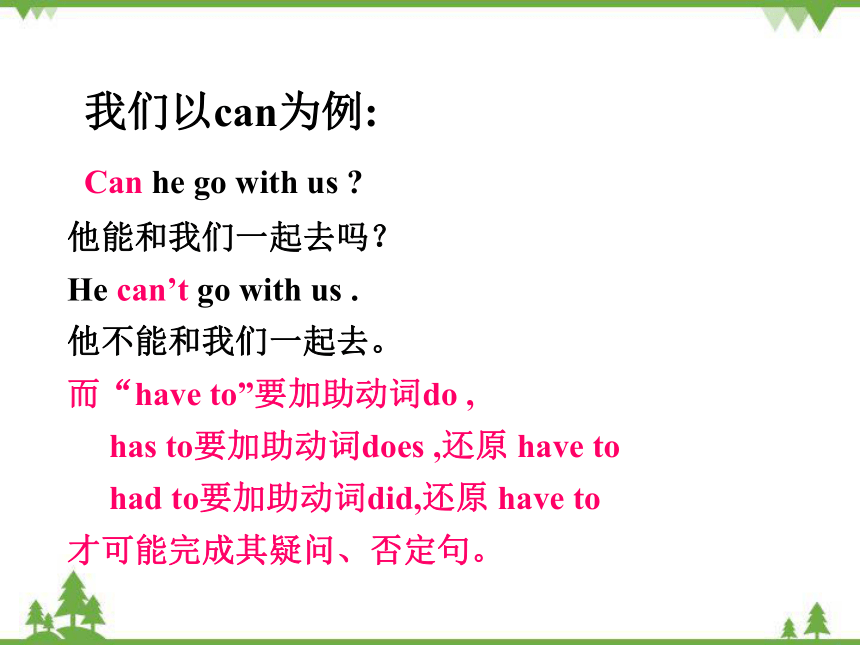
文档简介
(共43张PPT)
Unit 9 Can you come to my party
A: Can you swim
B: Yes, I can. /No, I can’t.
A: Can you play football
B: Yes, I can. /No, I can’t.
表示能力的回答
Language Goals:
Make invitations
Decline invitations
accept invitations
Talk about obligations
A: Can you come to my birthday party
B: Sure, I’d love \like to.
接受邀请的回答
A: Can you come to my birthday party
B: Sure, I’d love\like to.
A: Can you come to my birthday party
B: Sorry, I can’t. I have to …
拒绝邀请
的回答
help my parents.
Work in pairs
A: Can you come to my birthday party
B: Sorry, I can’t. …
自由操练 可参考图片
I have to prepare
for an exam .
Explanation
1. can 的用法
(1)表邀请。
若接受邀请,回答为:
OK./All right./Sure./ Of course./Certainly./
Yes(Sure),I’d love(like) to.
若不接受邀请,回答为:
Sorry,Ican’t.(+原因)
eg . Can you come to the party
Yes/Sure,I’d love/like to.
Sorry,Ican’t. I have to help my parents.
其他表邀请的句型:
1) Could /Will/Would you come to the party
2) Would you like /love to come to the party
3) I hope you come to the party.
4) Please come to the party.
5) How/What about coming to the party
(2)表能力“能,会”否定句 can’t不能
eg. He can swim,but I can’t.
How long can you stay under water
(3)在否定句,疑问句中表示“不可能”或“一定不”
eg. Can he come No,he can’t come.(他会来吗?不,他不能来.)
2.情态动词“have to”与其他的情态动词如:“can” , “may” “must”和 “should” 不同。
(1)这4个情态动词没有人称和数的变化,而have to有。它的第三人称单数为“has to” ,过去时为had to, 如:
He should study hard .
他应该好好学习。
He has to study hard .
他不得不好好学习。
(2)这4个情态动词在一般疑问句中将它们放在句首, 在否定句中直接在他
们后边加not即可。
我们以can为例:
Can he go with us
他能和我们一起去吗?
He can’t go with us .
他不能和我们一起去。
而“have to”要加助动词do ,
has to要加助动词does ,还原 have to
had to要加助动词did,还原 have to
才可能完成其疑问、否定句。
试将下面三种话分别写成
(1)一般疑问句,并做肯定回答。
(2)否定句。
1: They have to go to the party .
Do they have to go to the party
Yes , they do .
They don’t have to go to the party.
2:He has to go to see the doctor .
Does he have to go to see the doctor
Yes , he does .
He doesn’t have to go to see the
doctor .
3: She had to have a piano lesson yesterday.
Did she have to have a piano lesson
yesterday
Yes, she did .
She didn’t have to have a piano
lesson yesterday.
2 .have to强调客观上需要做某事,即表示外界 条件的需要不得不做某事,含有“客观所迫”的意味,它有人称和数的变化,可用于多种时态中,否定式为“不必”。
must强调说话者主观上认为必须做某事,含有“主观判断”的意味,它的否定式意为“禁止,不允许”。
eg. If one gets ill,he’ll have to see a doctor.
She has to go to school by bus.
We must go to school on time.
---Must I finish the homework now
---Yes, you must./No,you needn’t(don’t have to).
You mustn’t play football in the classroom.
3. I have to help my parents .
我不得不帮助我的父母。
help sb. with sth .或help sb (to) do sth .
上一句我们可以说:
I have to help my parents with the
housework .
或说I have to help my parents (to) do
the housework .
4. have 构成的短语
1). have a rest/look/swim/walk
2).have a meeting/class/lesson/drink(喝一杯饮料) /party
3).have breakfast/lunch/supper(dinner)/meals
4).have a good time/have fun (in) doing sth.
5).have a try 试一试
6). have sth on 穿戴着(不可用进行时)=be wearing
eg. But he has nothing on.可他什么也没穿。
7). have/let/make sb.do sth.=get sb.to do sth.让某人做某事
8). have sth.done 请/叫某人做某事
eg. I have the students answer my questions.我让学生回答我的问题。
Tim will have his hair cut tomorrow. Tim 明天要去理发。
Can you
A: Can you come to my birthday party
B: Sorry, I can’t. …
I have the flu .
=I have a cold.
=I catch a cold.
Can you
A: Can you come to my birthday party
B: Sorry, I can’t. …
I have to go to the doctor.
Can you
A: Can you come to my birthday party
B: Sorry, I can’t. …
I have to
meet my friend
Today we have learnt how to say “yes” or “no” to someone’s invitation and give a reason.
1) Can you … 常用于发出邀请.在口语也用would you like to … Could you …
2) Sure , I’d love to .这是对邀请的肯定回答, 表示接受邀请.Sure用于口语, 相当于Certainly, yes.
3) Sorry, I can’t. 是对邀请的否定回答。Have to “不得不, 必须”,三单用has to .
A:Can you come to my
party
B:I’m sorry. I have to
help my mom.
A: Can you play
tennis
B: Sure,I’d love to.
Can you…
A: Can you come to
my party
B: Sure,I’d love to.
A:Can you go to the
mall
B:I’m sorry. I’m going
to the movies.
Can you…
1a. Match the words with the pictures.
Match the words with the pictures[a-e]
prepare for an eaxm
meet my friend
have the flu
go to the doctor
help my parents
1. Prepare for an exam _______
2. help my parents _______
3. go to the doctor ______
4. meet my friend _______
5. have the flu _______
Check the answers!
b
c
d
e
a
1b Listen and write the names (Tim, Kay, Anna
and Wilson) next to the correct students in
the picture.
Tim
Anna
Kay
Wilson
1. I have to help my parents.
我不得不帮助我的父母。
help sb. with sth.或help sb (to) do sth.
上一句我们可以说:
I have to help my parents with the
housework.
或说 I have to help my parents (to) do
the housework.
Language points
2. invite v. 邀请 invite sb. to sth.
e.g. Lucy invites me to her party.
The Smiths invite us to dinner.
invitation n. 邀请, 邀请书
e.g. make an invitation
accept an invitation
decline invitation
Thanks for your invitation!
3.I’m sorry, I’m not available.
真抱歉,我没有空。
此句中的available 表示“ 有空;不忙;
有时间交谈或聊天”, 其后还可用 to do 引
出具体的事情。例如:
Are you available tomorrow morning
明天早上你有空吗?
I’m afraid I’m not available to help with
the school show on the 19th.
我怕是没空来帮着准备学校19号的演出了。
4. I have an exam on Monday so I must
prepare for it.
周一有考试,所以我必须为其做准备。
一、prepare用作及物动词时
1). prepare sth.表示“准备......”,后接名词或
代词作宾语
e.g. Our English teacher was preparing the
lessons when I came into the office.
我进办公室时,我们的英语老师在备课。
当宾语是食物之类的东西时,可译为 “制;做”
e.g. Mother was preparing dinner in the
kitchen while Father was watching TV.
妈妈在做饭,而爸爸在看电视。
2). prepare sb. sth.表示"给......准备......",也可转换为prepare sth. for sb.
e.g. She prepared us a nice breakfast.
= She prepared a nice breakfast for us.
她给我们准备了可口的早餐。
3). prepare sb. for sth.
表示“使某人对某事有所准备” 例如:
She said so because she wanted to prepare her
father for the bad news.
她这样说因为她想使爸爸对那个坏消息有准备。
4). prepare to do sth.表示“准备做......”。
e.g. They were preparing to cross the river
when it began to rain.
他们正准备过河,突然下雨了。
二、prepare用作不及物动词时:
prepare for sth.表示"为......做准备“
e.g. The students are busy preparing for the
final exam. 学生们正在准备期末考试。
1c. Group work
A: Can you come to my party on
Saturday afternoon
B: Sure, I’d love to.
C: Sorry, I can’t. I have to prepare
for an exam.
D: I’m sorry, too. I must go to the
doctor.
How to accept an invitation
Yes, I’d love/like to.
Certainly, I’d love/like to.
Sure, I’d love/like to.
Thanks for your invitation.
Thanks for asking me.
How to decline an invitation
I’m sorry, I can’t. I have to…
I’d love to, but I have to…
Sorry, I can’t. I’m going to the movies.
Thanks for your invitation.
Thank you for asking me.
填空
1. --_______ you come to my party
--_______, I’d love to.
2. --_______ you go to the movies
--I’m sorry, I _______.
3. -- _______ you go to the basketball game
--No, I ______. I’m playing soccer.
4. --______ you go to the concert
--Great! I’d ______ _____.
5. -- _______ you go to the mall this week
--Sorry, I _______.
Can
Yes
Can
can’t
Can
can’t
Can
love to
Can
can’t
单项选择
1. I have _____ homework to do.
A. too many B. too much C. much too D. a few
2. He ___ stay at home, because his mother
was ill.
A. has to B. have to C. had D. had to
3. I went to the mountain _____.
A. next week B. the day after tomorrow
C. yesterday D. tomorrow
B
D
C
4. ____ Friday morning, I like to go to the
movie ___ friends.
A. In, on B. On, with C. On, and D. At, with
5. Would you please ____me ____ the
housework
help, in B. to help, with
C. help, doing D. help, do
B
D
6. Are you ___ football this weekend
A. playing B. play C. play a D. Plays
7. I have to go to my guitar lesson ____
19:00___20:00 __ the evening.
A. from, to, on B. in, at , on
C. from, to, in D. at, at, on
A
C
Unit 9 Can you come to my party
A: Can you swim
B: Yes, I can. /No, I can’t.
A: Can you play football
B: Yes, I can. /No, I can’t.
表示能力的回答
Language Goals:
Make invitations
Decline invitations
accept invitations
Talk about obligations
A: Can you come to my birthday party
B: Sure, I’d love \like to.
接受邀请的回答
A: Can you come to my birthday party
B: Sure, I’d love\like to.
A: Can you come to my birthday party
B: Sorry, I can’t. I have to …
拒绝邀请
的回答
help my parents.
Work in pairs
A: Can you come to my birthday party
B: Sorry, I can’t. …
自由操练 可参考图片
I have to prepare
for an exam .
Explanation
1. can 的用法
(1)表邀请。
若接受邀请,回答为:
OK./All right./Sure./ Of course./Certainly./
Yes(Sure),I’d love(like) to.
若不接受邀请,回答为:
Sorry,Ican’t.(+原因)
eg . Can you come to the party
Yes/Sure,I’d love/like to.
Sorry,Ican’t. I have to help my parents.
其他表邀请的句型:
1) Could /Will/Would you come to the party
2) Would you like /love to come to the party
3) I hope you come to the party.
4) Please come to the party.
5) How/What about coming to the party
(2)表能力“能,会”否定句 can’t不能
eg. He can swim,but I can’t.
How long can you stay under water
(3)在否定句,疑问句中表示“不可能”或“一定不”
eg. Can he come No,he can’t come.(他会来吗?不,他不能来.)
2.情态动词“have to”与其他的情态动词如:“can” , “may” “must”和 “should” 不同。
(1)这4个情态动词没有人称和数的变化,而have to有。它的第三人称单数为“has to” ,过去时为had to, 如:
He should study hard .
他应该好好学习。
He has to study hard .
他不得不好好学习。
(2)这4个情态动词在一般疑问句中将它们放在句首, 在否定句中直接在他
们后边加not即可。
我们以can为例:
Can he go with us
他能和我们一起去吗?
He can’t go with us .
他不能和我们一起去。
而“have to”要加助动词do ,
has to要加助动词does ,还原 have to
had to要加助动词did,还原 have to
才可能完成其疑问、否定句。
试将下面三种话分别写成
(1)一般疑问句,并做肯定回答。
(2)否定句。
1: They have to go to the party .
Do they have to go to the party
Yes , they do .
They don’t have to go to the party.
2:He has to go to see the doctor .
Does he have to go to see the doctor
Yes , he does .
He doesn’t have to go to see the
doctor .
3: She had to have a piano lesson yesterday.
Did she have to have a piano lesson
yesterday
Yes, she did .
She didn’t have to have a piano
lesson yesterday.
2 .have to强调客观上需要做某事,即表示外界 条件的需要不得不做某事,含有“客观所迫”的意味,它有人称和数的变化,可用于多种时态中,否定式为“不必”。
must强调说话者主观上认为必须做某事,含有“主观判断”的意味,它的否定式意为“禁止,不允许”。
eg. If one gets ill,he’ll have to see a doctor.
She has to go to school by bus.
We must go to school on time.
---Must I finish the homework now
---Yes, you must./No,you needn’t(don’t have to).
You mustn’t play football in the classroom.
3. I have to help my parents .
我不得不帮助我的父母。
help sb. with sth .或help sb (to) do sth .
上一句我们可以说:
I have to help my parents with the
housework .
或说I have to help my parents (to) do
the housework .
4. have 构成的短语
1). have a rest/look/swim/walk
2).have a meeting/class/lesson/drink(喝一杯饮料) /party
3).have breakfast/lunch/supper(dinner)/meals
4).have a good time/have fun (in) doing sth.
5).have a try 试一试
6). have sth on 穿戴着(不可用进行时)=be wearing
eg. But he has nothing on.可他什么也没穿。
7). have/let/make sb.do sth.=get sb.to do sth.让某人做某事
8). have sth.done 请/叫某人做某事
eg. I have the students answer my questions.我让学生回答我的问题。
Tim will have his hair cut tomorrow. Tim 明天要去理发。
Can you
A: Can you come to my birthday party
B: Sorry, I can’t. …
I have the flu .
=I have a cold.
=I catch a cold.
Can you
A: Can you come to my birthday party
B: Sorry, I can’t. …
I have to go to the doctor.
Can you
A: Can you come to my birthday party
B: Sorry, I can’t. …
I have to
meet my friend
Today we have learnt how to say “yes” or “no” to someone’s invitation and give a reason.
1) Can you … 常用于发出邀请.在口语也用would you like to … Could you …
2) Sure , I’d love to .这是对邀请的肯定回答, 表示接受邀请.Sure用于口语, 相当于Certainly, yes.
3) Sorry, I can’t. 是对邀请的否定回答。Have to “不得不, 必须”,三单用has to .
A:Can you come to my
party
B:I’m sorry. I have to
help my mom.
A: Can you play
tennis
B: Sure,I’d love to.
Can you…
A: Can you come to
my party
B: Sure,I’d love to.
A:Can you go to the
mall
B:I’m sorry. I’m going
to the movies.
Can you…
1a. Match the words with the pictures.
Match the words with the pictures[a-e]
prepare for an eaxm
meet my friend
have the flu
go to the doctor
help my parents
1. Prepare for an exam _______
2. help my parents _______
3. go to the doctor ______
4. meet my friend _______
5. have the flu _______
Check the answers!
b
c
d
e
a
1b Listen and write the names (Tim, Kay, Anna
and Wilson) next to the correct students in
the picture.
Tim
Anna
Kay
Wilson
1. I have to help my parents.
我不得不帮助我的父母。
help sb. with sth.或help sb (to) do sth.
上一句我们可以说:
I have to help my parents with the
housework.
或说 I have to help my parents (to) do
the housework.
Language points
2. invite v. 邀请 invite sb. to sth.
e.g. Lucy invites me to her party.
The Smiths invite us to dinner.
invitation n. 邀请, 邀请书
e.g. make an invitation
accept an invitation
decline invitation
Thanks for your invitation!
3.I’m sorry, I’m not available.
真抱歉,我没有空。
此句中的available 表示“ 有空;不忙;
有时间交谈或聊天”, 其后还可用 to do 引
出具体的事情。例如:
Are you available tomorrow morning
明天早上你有空吗?
I’m afraid I’m not available to help with
the school show on the 19th.
我怕是没空来帮着准备学校19号的演出了。
4. I have an exam on Monday so I must
prepare for it.
周一有考试,所以我必须为其做准备。
一、prepare用作及物动词时
1). prepare sth.表示“准备......”,后接名词或
代词作宾语
e.g. Our English teacher was preparing the
lessons when I came into the office.
我进办公室时,我们的英语老师在备课。
当宾语是食物之类的东西时,可译为 “制;做”
e.g. Mother was preparing dinner in the
kitchen while Father was watching TV.
妈妈在做饭,而爸爸在看电视。
2). prepare sb. sth.表示"给......准备......",也可转换为prepare sth. for sb.
e.g. She prepared us a nice breakfast.
= She prepared a nice breakfast for us.
她给我们准备了可口的早餐。
3). prepare sb. for sth.
表示“使某人对某事有所准备” 例如:
She said so because she wanted to prepare her
father for the bad news.
她这样说因为她想使爸爸对那个坏消息有准备。
4). prepare to do sth.表示“准备做......”。
e.g. They were preparing to cross the river
when it began to rain.
他们正准备过河,突然下雨了。
二、prepare用作不及物动词时:
prepare for sth.表示"为......做准备“
e.g. The students are busy preparing for the
final exam. 学生们正在准备期末考试。
1c. Group work
A: Can you come to my party on
Saturday afternoon
B: Sure, I’d love to.
C: Sorry, I can’t. I have to prepare
for an exam.
D: I’m sorry, too. I must go to the
doctor.
How to accept an invitation
Yes, I’d love/like to.
Certainly, I’d love/like to.
Sure, I’d love/like to.
Thanks for your invitation.
Thanks for asking me.
How to decline an invitation
I’m sorry, I can’t. I have to…
I’d love to, but I have to…
Sorry, I can’t. I’m going to the movies.
Thanks for your invitation.
Thank you for asking me.
填空
1. --_______ you come to my party
--_______, I’d love to.
2. --_______ you go to the movies
--I’m sorry, I _______.
3. -- _______ you go to the basketball game
--No, I ______. I’m playing soccer.
4. --______ you go to the concert
--Great! I’d ______ _____.
5. -- _______ you go to the mall this week
--Sorry, I _______.
Can
Yes
Can
can’t
Can
can’t
Can
love to
Can
can’t
单项选择
1. I have _____ homework to do.
A. too many B. too much C. much too D. a few
2. He ___ stay at home, because his mother
was ill.
A. has to B. have to C. had D. had to
3. I went to the mountain _____.
A. next week B. the day after tomorrow
C. yesterday D. tomorrow
B
D
C
4. ____ Friday morning, I like to go to the
movie ___ friends.
A. In, on B. On, with C. On, and D. At, with
5. Would you please ____me ____ the
housework
help, in B. to help, with
C. help, doing D. help, do
B
D
6. Are you ___ football this weekend
A. playing B. play C. play a D. Plays
7. I have to go to my guitar lesson ____
19:00___20:00 __ the evening.
A. from, to, on B. in, at , on
C. from, to, in D. at, at, on
A
C
同课章节目录
- Unit 1 Where did you go on vacation?
- Section A
- Section B
- Unit 2 How often do you exercise?
- Section A
- Section B
- Unit 3 I'm more outgoing than my sister.
- Section A
- Section B
- Unit 4 What's the best movie theater?
- Section A
- Section B
- Unit 5 Do you want to watch a game show?
- Section A
- Section B
- Unit 6 I'm going to study computer science.
- Section A
- Section B
- Unit 7 Will people have robots?
- Section A
- Section B
- Unit 8 How do you make a banana milk shake?
- Section A
- Section B
- Unit 9 Can you come to my party?
- Section A
- Section B
- Unit 10 If you go to the party, you'll have a grea
- Section A
- Section B
